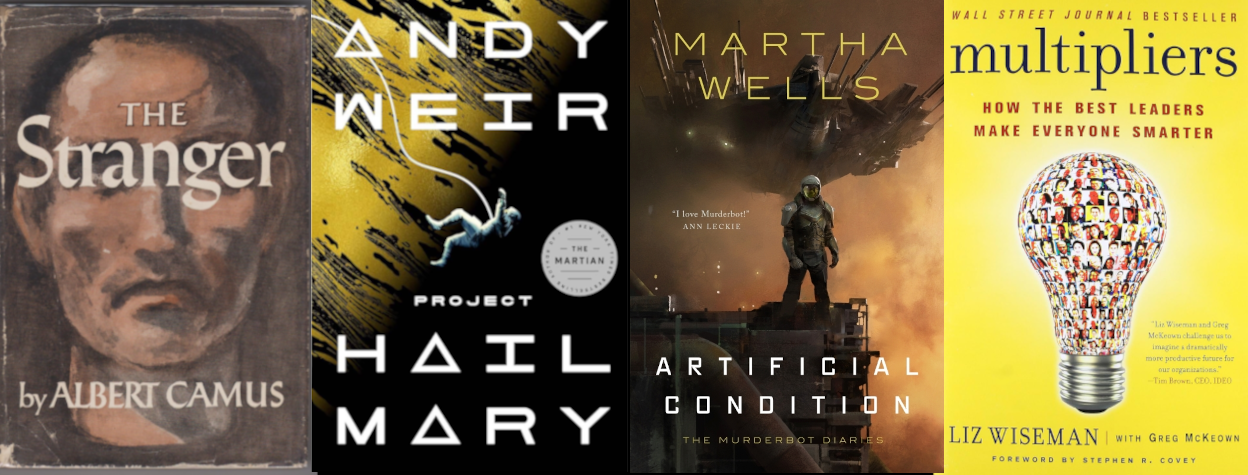What I read in 2023
This was a very eventful year, which lead me to read much less that I use to. Still I want to highlight a couple of books that impacted me the most. Similarly to previous years, I leaned towards sci-fi works. I finally came round to reading Andy Weir's latest work, but I also delved into some technical leadership and existentialism reading.
The Stranger, Albert Camus
In 'The Stranger,' the constant indifference of Meursault casts a haunting shadow over the whole narrative, evoking in me a mix of discomfort and fascination. Meursault's indifference, his lack of emotional response, and seemingly aimless existence challenge our conventional notion of human behavior. We all engage in some sense of purpose to varying degrees, whether it be striving for success, wealth, or making a difference in someone else's life, among others. However, Meursault's character embodies none of these motivations; he feels like a mere spectator of the events unfolding before him, almost akin to an NPC-like experience.
This absence of purpose, and his refusal to conform to societal expectations grant him a peculiar freedom - a liberation from the relentless pursuit of meaning. I found some sense of liberation in his detachment, in some sense, he felt very close to the raw essence of "existence", whatever that may be.
Now as for balancing these two remarks about Meursault's character: the lack of empathy, while affording him a certain freedom, ultimately renders him incompatible with the fabric of society. His approach ultimately runs counter to our evolutionary imperative as social beings. So, there's some kind of paradox at play: while detachment allows him to come closer to "existing", it heavily contrasts with what defines our humanity: creating empathy and forging social connections.
Mother died today. Or maybe yesterday; I can't be sure.
Project Hail Mary, Andy Weir
Andy Weir's "Project Hail Mary" delivers a fascinating narrative that mixes elaborated scientific concepts with an engaging storyline. From start to finish, the novel captivated me with its balance of complexity and accessibility, providing me with a satisfying blend of scientific stimulation, puzzle-solving fulfillment and narrative intrigue.
One of the features that stood out for me was the use of flashbacks to gradually unveil the protagonist's past and piece together the puzzle of his memory loss. These glimpses into the protagonist's history helped me connect and deepen my understanding of his character.
Initially, when the narrative transitioned into a flashback, I found myself eager to return to the present storyline as soon as possible. Still, I have to acknowledge that the eventual return proved highly gratifying. Piecing together the puzzle of the protagonist's past with the story with newfound information was very satisfying.
Overall, the narrative felt organically structured, always leading towards something significant, which kept me hooked until the very end. It was great storytelling experience on some of themes I find most compelling: astrophysics, biology and space exploration.
Grumpy. Angry. Stupid. How long since last sleep, question?
Artificial Condition, Martha Wells
This is the second installment of Martha Wells' "Murderbot Diaries" series, which continues to follow the journey of Murderbot, a self-aware security unit. Despite its original programming for protection and security, Murderbot has achieved autonomy and now operates in secret freedom.
As with the first novella in the series, Murderbot serves as the first-person narrator, adding a clever and dry humor to the narrative. Murderbot's relatable and somewhat human-like qualities are evident as it yearns for independence, autonomy, and even moments of solitude to indulge in its love for soap operas.
In this entry, Murderbot embarks on further self-discovery, interacting with new humans who are, in fact, its clients, as well as encountering an intelligent spaceship aptly named ART (Asshole Research Transport).
I will keep reading this, not mainly for the narratives, but specially because Murderbot is a very fun character. While the narrative itself is engaging, I will keep reading this series primary for the immensely entertaining Murderbot.
So they made us smarter. The anxiety and depression were side effects.
Multipliers, Liz Wiseman and Greg McKeown
"Multipliers" stands out as the sole technical book in my reading list this year. As I transitioned into a leadership role, I struggled with the challenge of adapting to new responsibilities and this book helped me pinpoint what I was doing right and what I was doing wrong.
One of the most profound realizations that came from this experience and this book was the understanding that effective leadership is not a one-size-fits-all solution.
Rather, it's a multifaceted spectrum that requires adaptability and agility. "Multipliers" helped me recognized these facets with very clear chapter structure and enlightening examples illustrating different approaches to a problem and their outcomes. It also shows me I still have a long way to go.
When faced with a new leadership challenge, I often find myself referring back to my notes from "Multipliers". The breadth of topics covered, combined with the accessible and concise language, is impressive. I highly recommend it to anyone seeking or in a leadership role.
Finding people’s native genius and then labeling it is a direct approach to drawing more intelligence from them.
Conclusion
Keeping the tradition of recalling the books I read every year has been very rewarding. It serves not only to consolidate and review the knowledge acquired throughout the past year but also offers the opportunity to revisit insights gained from previous years.
Looking forward to reading more great books in 2024!
